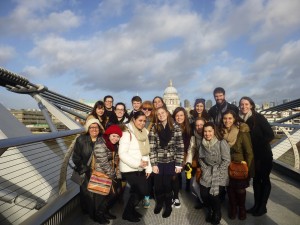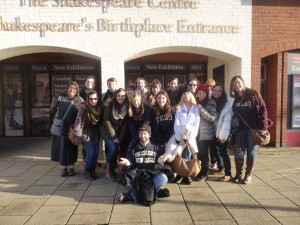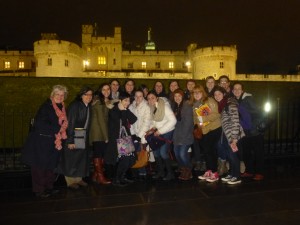During the winter break, one HSS professor led students on a tour of everything theater–in none other than London, of course.

First created by Dr. Felicia Jean Steele (English) and Professor Diane Vanner Steinberg (English) in 2012, LIT 367 explores British Theatre in its country, and city, of origin. The students on the trip divided their time equally between museum and art gallery tours, and of course seeing British plays. Prof. Steinberg sits down with us here to discuss more about how she decided the course’s material and why studying theater still matters:
1) What material did you teach and how did you approach the course?
My approach to the class has always been “Learn some things together as a group; learn other things on your own.” We try to balance mandatory with optional learning experiences. For example, students take a “Highlights of the British Museum” guided tour…and then have the afternoon free to explore other galleries and exhibits in the Museum.
The course is built around the 8 plays we saw, however, and the historical and cultural sites supplement the plays.
Among this list, Prof. Steinberg listed classics such as Matilda, the Musical, Henry V, Hamlet, and a British-adapted Italian show called ” One Man, Two Guvnors,” which fit nicely with the itinerary “because of its ties to theatrical history, British humor, and Shakespeare comedy.”

2) How is teaching in a classroom different than leading a field tour (other than the geographical difference, of course)?
Much teaching takes place informally — inside Westminster Abbey, beside an exhibit of Church silver in the Victoria and Albert Museum, at breakfast in the dorm, during a bus ride. We schedule sit down dinners or lunches together every other day on the trip so that we can share what we learned and did in our unscheduled time.
We also have scheduled “classroom” time at the dorm, in the Globe Theatre, at the Royal Shakespeare Company’s learning center in Stratford-Upon-Avon, and at a meeting room in our Stratford Hotel. Most of these class sessions are led by me, and we make time to discuss each play before we see it and to discuss our response to its performance choices after we have seen it.
On top of that, students read each play in advance, most of the reading having been completed upon arrival in London.

3) What do you believe is the importance of studying theater for students today?
Of course, I believe that all art should be studied by all people. I have a special love for theatrical art because I am a literature person, and words are important to me. I also have a special love of theatre because I see it as group art…Many accomplishments we celebrate are solo accomplishments, but theatre celebrates our capacity to work in cooperation with one another, and theatre helps us see that we can do something together that we cannot do alone.
What is more, four TCNJ students were selected at the end of the performance of Bring up the Bodies to voice their opinion. Please visit the follow link to enjoy some insightful (and HSS-approved) commentary: http://www.rsc.org.uk/whats-on/bring-up-the-bodies/what-the-audience-thinks.aspx
The first two students are: Samantha Miller and Steven Munoz
The second group is: Erin Brendel and Garrett Verdone
